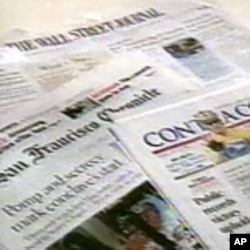Monday (May 3) is World Press Freedom Day. The day was created in the early 1990s by the United Nations to “promote the free flow of information, media independence and pluralism” and, at the same time, raise awareness of the dangers faced by journalists.
Professor Kwame Karikari,executive director of the Media Foundation for West Africa said while there are still scattered attacks on the media and journalists in some West African countries, the most pressing concern for many independent media institutions is one of economic survival.
“The situation in West Africa is stable, but we still have to deal with many difficult occurrences. About three days ago, about two or three Nigerian journalists were murdered by unknown assailants. That kind of thing is a reminder of the bad days that we have seen in the past in a number of countries. Otherwise, the situation of the media in West Africa generally is now more a question of survival in terms of economic conditions for the operation of the media,” he said.
Professor Karikari said the current world economic down turn couple with the lack of advertising are to blame for the plight of the independent media in West Africa.
“In West Africa, it is not because more people have access to new technology as a means to accessing information. But, it’s simply the question of difficult economic circumstances for citizens to buy newspapers, and also the difficulty of accessing advertising revenues because businesses in many countries are not vibrant. So, the private sector that should feed the media with advertising is so weak,” Karikari said.
He said even in some situations where there are advertising revenues in some countries, the state-owned media, particularly broadcasting media, almost always get the bulk of those advertising revenues.
Karikari said politicians in some West African countries sometimes use libel or the threat of such lawsuits to intimate journalists.
But, he said in most cases such libel suits are the result of poor professional standards on the part some journalists.
“Many media in West Africa face numerous libel cases, that is, civil defamation cases in the courts. In many cases, these libel suits are instituted by politicians. But, also, it has a lot to do with do, in many, many instances, with the poor professional standards of media in our region. Sometimes, accusations are made without proper investigation or without proper authentication,” he said.
Karikari said the Media Foundation for West Africa is trying to improve professionalism among journalists in the sub-region.
“We have to appeal to the media to try and institute training programs for their members. Also, we try to influence the media to understand that being independent as an institution of information is the way to go because there are too many media in our region nowadays who are influenced by political factions or sectors,” Karikari said.
He said his organization sometimes holds actual training programs in Ghana and Benin to improve the professionalism of West African journalists.




